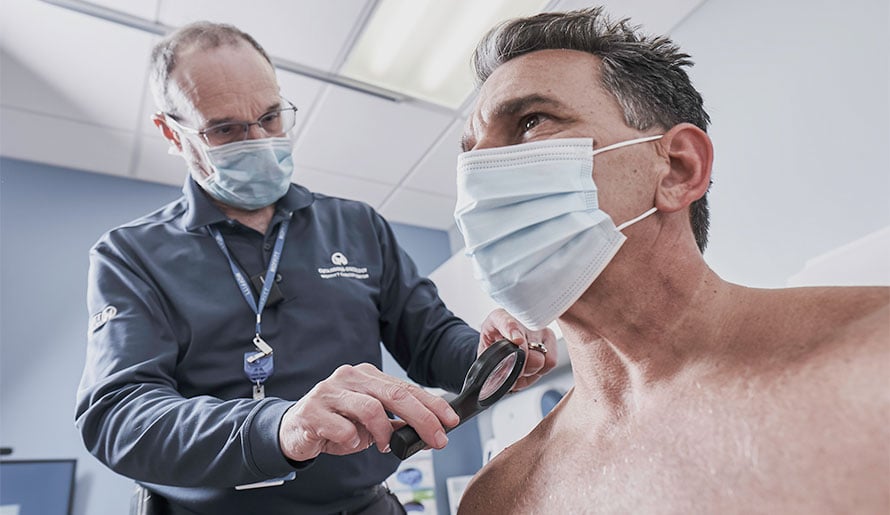Melanoma Diagnosis

A person may seek a melanoma diagnosis upon noticing a lesion or abnormal area of skin on his or her body. A physician will typically begin by asking about the patient’s medical history and symptoms, but in order to make an accurate diagnosis, a biopsy is usually necessary. The Cutaneous Oncology Program at Moffitt Cancer Center offers the latest in diagnostic procedures, and once the initial biopsy is done, Moffitt’s experienced dermatopathologists will confirm the results.
Sometimes a melanoma diagnosis requires further testing to help in identifying the extent, or stage, of the cancer. These tests may include:
- Computed tomography (CT) scans
- Magnetic resonance imaging (MRI)
- Positron emission tomography (PET) scans
- X-rays
- Fine needle aspiration biopsies of lymph nodes or other areas of suspected metastasis
- Lymphatic mapping, or lymphoscintigraphy
- Sentinel lymph node biopsy
When Should You Get Moles Checked by a Doctor?
While it’s important to receive a yearly skin check by a dermatologist, performing regular skin checks at home will help you identify when a new mole appears or know when a spot is changing in size, shape or color. By following the ABCDE rule when you’re checking moles, you’ll be able to identify troublesome spots and point them out to your doctor:
- Asymmetry – Both halves of the mole do not match up in appearance.
- Border – You can feel a ragged, irregular, blurred or notched border.
- Color – The mole is not one color throughout; it may be black and brown and may even have shades of pink, red, white or blue.
- Diameter – It’s larger than 6 millimeters in diameter.
- Evolving – You can tell that the mole is changing in shape, size or color.
Moffitt Cancer Center’s Approach to Melanoma Diagnosis
At Moffitt, our skin cancer program is made up of a wide range of specialists, covering all areas of expertise. Our multispecialty team works closely, reviewing cases together in a tumor board. This unique process ensures that patients who have a complicated diagnosis, receive a timely and comprehensive melanoma treatment plan that is individualized for his or her specific case.
If you have already received a melanoma diagnosis, the skin cancer experts at Moffitt can review past labwork, biopsies and scans to offer a second opinion. Or, if you have not yet been diagnosed, you can visit Moffitt without a referral and speak with our oncologists specializing in skin cancer. Call us at 1-888-663-3488 or complete our online new patient registration form. Moffitt also offers free screenings to the public through the Mole Patrol®, a mobile screening program that checks for melanoma as well as other forms of skin cancer.
Diagnosis
